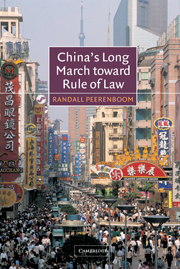Book contents
- Frontmatter
- Contents
- Preface
- List of abbreviations
- 1 Introduction
- 2 The evolution of rule of law in China: the role of law in historical context
- 3 Post-Mao reforms: competing conceptions of rule of law
- 4 Rule of law and its critics
- 5 Retreat of the Party and the state
- 6 The legislative system: battling chaos
- 7 The judiciary: in search of independence, authority, and competence
- 8 The legal profession: the quest for independence and professionalism
- 9 The administrative law regime: reining in an unruly bureaucracy
- 10 Rule of law and economic development
- 11 Rule of law, democracy, and human rights
- 12 Conclusion: the future of legal reform
- References
- Index
11 - Rule of law, democracy, and human rights
Published online by Cambridge University Press: 20 July 2009
- Frontmatter
- Contents
- Preface
- List of abbreviations
- 1 Introduction
- 2 The evolution of rule of law in China: the role of law in historical context
- 3 Post-Mao reforms: competing conceptions of rule of law
- 4 Rule of law and its critics
- 5 Retreat of the Party and the state
- 6 The legislative system: battling chaos
- 7 The judiciary: in search of independence, authority, and competence
- 8 The legal profession: the quest for independence and professionalism
- 9 The administrative law regime: reining in an unruly bureaucracy
- 10 Rule of law and economic development
- 11 Rule of law, democracy, and human rights
- 12 Conclusion: the future of legal reform
- References
- Index
Summary
The preceding chapters have focused on rule of law in China: its evolution, competing conceptions of it, institutional obstacles to its realization, and its role in economic development. Yet many who invoke rule of law (particularly in the West) do so not in the name of providing the necessary predictability required in a market economy but rather in relation to two of the other hallmarks of modernity discussed in the Introduction: democracy and human rights. In this chapter, therefore, I discuss the relationship between rule of law, democracy, and human rights.
After a brief summary of various conceptions of democracy and the main arguments for and against implementing democracy in China at this time, I turn to the debate surrounding the relationship between democracy and economic development. Though the empirical evidence is mixed on the general issue of their relationship, there is ample evidence that authoritarian regimes may achieve sustained economic growth, and that economic development and rule of law need not lead to liberal democracy, at least for a long time. I argue that, for a variety of reasons, the short-term prospects for democracy in China are not promising. In the long run, however, China is likely to become democratic, though probably not a liberal democracy. Rather, the more likely outcome will be a nonliberal soft authoritarian or communitarian form of democracy. Rule of law may serve as an intermediate step along that route.
- Type
- Chapter
- Information
- China's Long March toward Rule of Law , pp. 513 - 557Publisher: Cambridge University PressPrint publication year: 2002



